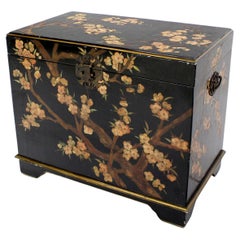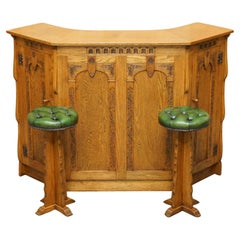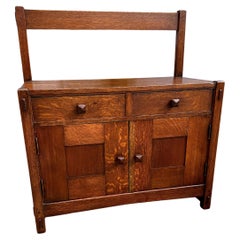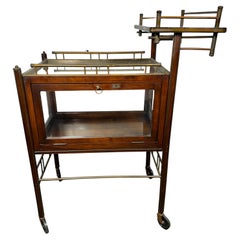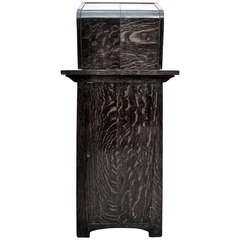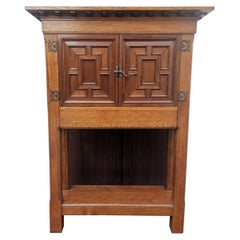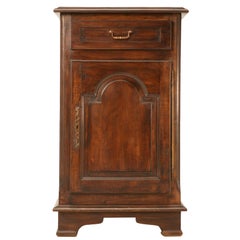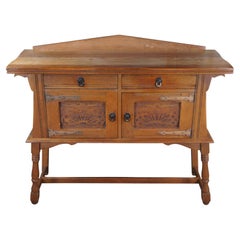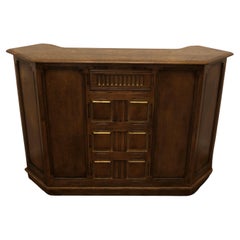Arts and Crafts Dry Bars
Emerging in reaction to industrialization and mass production, the Arts and Crafts movement celebrated handcrafted design as a part of daily life. The history of Arts and Crafts furniture has roots in 1860s England with an emphasis on natural motifs and simple flourishes like mosaics and carvings. This work is characterized by plain construction that showcases the hand of the artisan.
The earliest American Arts and Crafts furniture dates back to the start of the 20th century. Designers working in this style in the United States initially looked to ideas put forth by The Craftsman, a magazine published by Wisconsin native Gustav Stickley, a furniture maker and founder of the Craftsman style. Stickley’s furniture was practical and largely free of ornament. His Craftsman style drew on French Art Nouveau as well as the work he encountered on his travels in England. There, the leading designers of the Arts and Crafts movement included William Morris, who revived historical techniques such as embroidery and printed fabrics in his furnishings, and Charles Voysey, whose minimal approach was in contrast to the ornamentation favored in the Victorian era.
American Arts and Crafts work would come to involve a range of influences unified by an elevation of traditional craftsmanship. The furniture was often built from sturdy woods like oak and mahogany while featuring details such as inlaid metal, tooled leather and ceramic tiles. The style in the United States was led by Stickley, whose clean-lined chairs and benches showcased the grain of the wood, and furniture maker Charles Rohlfs, who was informed by international influences like East Asian and French Art Nouveau design.
Hubs in America included several utopian communities such as Rose Valley in Pennsylvania and the Byrdcliffe Arts and Crafts Colony in New York, where craftspeople made furniture that prioritized function over any decoration. Their work would influence designers and architects including Frank Lloyd Wright, who built some of the most elegant and iconic structures in the United States and likewise embraced a thoughtful use of materials in his furniture.
Find antique Arts and Crafts chairs, tables, cabinets and other authentic period furniture on 1stDibs.
20th Century Japanese Arts and Crafts Dry Bars
Hardwood
1940s English Vintage Arts and Crafts Dry Bars
Leather, Oak
Early 20th Century American Arts and Crafts Dry Bars
Oak
Early 20th Century German Arts and Crafts Dry Bars
Brass
Early 20th Century American Arts and Crafts Dry Bars
Brass
1890s English Antique Arts and Crafts Dry Bars
Oak
21st Century and Contemporary Baltic Arts and Crafts Dry Bars
Stone, Metal
1930s French Vintage Arts and Crafts Dry Bars
Oak
Late 20th Century European Arts and Crafts Dry Bars
Teak
1950s Mexican Vintage Arts and Crafts Dry Bars
Brass
21st Century and Contemporary Arts and Crafts Dry Bars
Fabric, Wood
21st Century and Contemporary French Arts and Crafts Dry Bars
Chrome
Late 20th Century American Arts and Crafts Dry Bars
Oak
Early 1900s American Antique Arts and Crafts Dry Bars
Copper
1960s American Vintage Arts and Crafts Dry Bars
Wood
1950s French Vintage Arts and Crafts Dry Bars
Iron
Mid-20th Century English Arts and Crafts Dry Bars
Walnut
1960s Italian Vintage Arts and Crafts Dry Bars
Wood, Fruitwood
Mid-20th Century Arts and Crafts Dry Bars
Walnut
Early 20th Century Arts and Crafts Dry Bars
Oak
1920s Vintage Arts and Crafts Dry Bars
Oak
Early 20th Century American Arts and Crafts Dry Bars
Oak
Early 1900s British Antique Arts and Crafts Dry Bars
Iron
Early 20th Century German Arts and Crafts Dry Bars
Brass
1920s American Vintage Arts and Crafts Dry Bars
Oak
1920s American Vintage Arts and Crafts Dry Bars
Oak
1920s American Vintage Arts and Crafts Dry Bars
Walnut
Early 20th Century Dutch Arts and Crafts Dry Bars
Brass
Early 20th Century American Arts and Crafts Dry Bars
Oak
Early 20th Century Dutch Arts and Crafts Dry Bars
Brass
20th Century American Arts and Crafts Dry Bars
Oak
